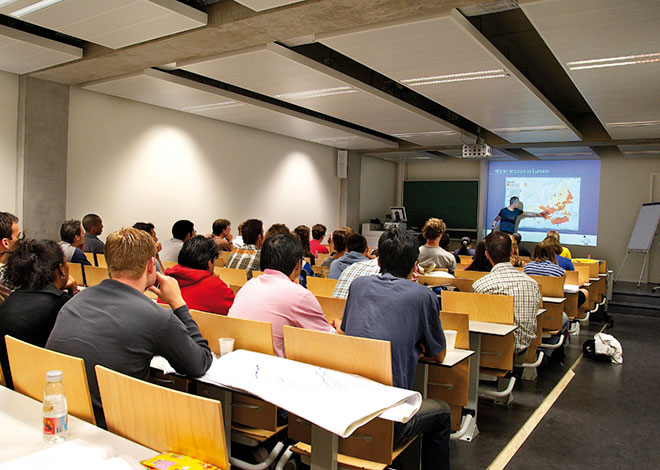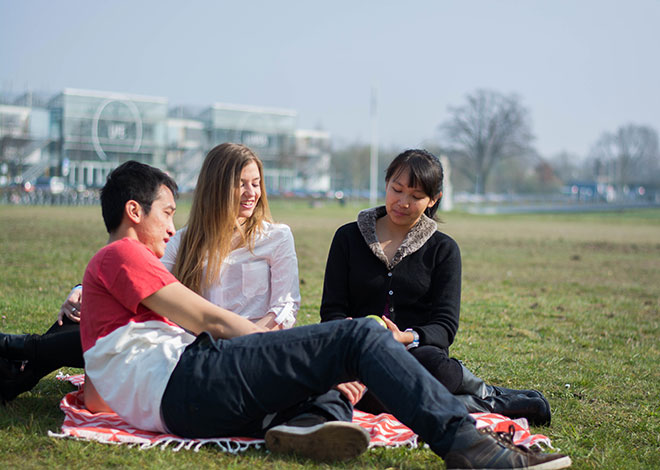Problems when studying? Ask for help
Problems when studying are common. ‘That’s part of becoming an adult,’ said student dean Marc Uijland. ‘A student has to have the chance to “fall flat on his face”. It’s a learning process, part of becoming independent. And studying is a relatively safe environment to learn that in. But it’s important to discover where your limits are. And to know what sort of help is available.’ (In het Nederlands, in Dutch)

Problems when studying are common. ‘That’s part of becoming an adult,’ said student dean Marc Uijland.
Parents (too?) concerned
I understand it when Marc says that ‘problems when studying’ are common. You can only become an adult by learning how you can cope with your problems. But I’m also listening as a mother to what he says… If I’m honest, I’d like to protect my children against all setbacks. I’d prefer to smooth away every wrinkle in their lives. But of course I know that Marc is right. Setbacks are part of life. And learning how to cope with them is part of becoming independent. And it’s also true that it’s best to learn this when you’re young… But still? Am I too concerned as a parent? I asked Marc what he advises parents.
Be involved in the background
‘It’s important that students feel that their parents are involved. It’s fine when they know that their parents support them. I prefer to see parents ‘involved in the background’. That involvement is important. But keeping some distance as a parent is also essential. Students have to learn to take control of their own lives. I also think it’s essential that parents tell their children to look for help if that’s necessary.’
As a student dean do you have contact with parents?
‘What sort of contact do you have with parents?’ I asked Marc. ‘And especially regarding problems when studying?’
‘You’re referring to a difficult matter,’ said Marc. ‘The law states that students are entitled to privacy. We must and we want to consider them as adults. These rules also apply if a student is a minor. I think this is good. A student has a right to his or her own life. But parents do phone me now and again to ask how their child is doing. I can never answer that question.’
Do you never see parents?
‘So do you never see the parents of students?’ I asked.
‘Oh yes. If a first-year student asks me if his or her parents could join us, I think that’s fine. The parents can listen to the discussion. And a parent can also lend moral support to a student who’s having a hard time. But the initiative has to come from the student. That happens now and again if a student is having psychological problems or if they have a handicap. And of course parents themselves can contact us if they want to know how we work. I understand that parents want to know how we handle study stress and depression, for example. And parents also sometimes want to know when we refer a student to a psychologist, for example. Parents want to know what we can do in special circumstances, and I’m happy to tell them. But we never give personal information about students.’
Preventing problems when studying
‘But now you’re talking about a situation in which problems already exist,’ I explained. ‘Can you as a parent also prevent problems?’
‘As a student dean, I think it’s more important to prevent problems,’ Marc said. ‘If a student knows about special circumstances, I’d like to hear that before he or she starts studying. A student with dyslexia can be given special facilities from the very beginning. If there are hearing or seeing handicaps, we will look for a solution. Students with autism can ask for special help. These are just a few examples. The core of what I want to say is: get in touch before your studies begin if you think that certain help is needed.’
How much help is there and what’s the quality?
‘I think it’s important that parents (and students) know about the help that the university or hbo (university for applied sciences) can offer. Parents who know that their child needs extra care should investigate how the support is arranged. On sites devoted to choosing a study, you can see what students at an institution think about the support given there. This is based on a national questionnaire that’s held every year among hbo and university students. There’s also a comparison site of the expertise centre for handicap and study. Of course, students themselves are responsible for their choice of study programme. But it can help if parents also take a look. Are students given good support at this institution?’
Teach your child to look for help
‘You have to learn to look for help. Sometimes, students think they’re ‘failing’ if they need extra support. But that’s not at all true. Everyone has phases in his or her life in which things don’t go as well they could. And it’s very important that you know how to look for help then. That’s something that you have to learn. Parents have to teach their children to be independent, but also to know that you sometimes have to ask for help if you need it.
I also advise parents to find out who their child’s study counsellor is. The study counsellor can help with study-related problems, such as not getting enough credits. Of course, students themselves know who their study counsellor is… but if you notice that your child is having problems when studying, then you can mention the name of someone who can offer support. You can compare the study counsellor to the mentor at the secondary school.
If as a parent you notice that something isn’t quite right with your child, then you can also advise them to contact us.’
How does a student dean work?
‘It’s also important for parents to know how a student dean works. How can the student dean be reached? (example WUR) Who are the student deans? Are there other supervisors, such as a student psychologist, a general practitioner or a confidential counsellor?’
These are the areas in which a student dean at WUR works:
- Studying with a handicap
- Study delay because of special circumstances
- Regulations and facilities (e.g. the Financial Support for Students regulation (FOS), top sports and educational adjustments)
- Temporarily withdrawing, stopping or another study programme
- Financial affairs (study financing, scholarships, private funds)
- Mediating, complaints, objection and appeal procedures
Each university of applied sciences (hbo) and university has one or more student deans.
Choosing a study programme with a handicap
‘About 20% of young adults have a functional impediment. That can be something relatively small, but it can also be a serious handicap. We want incoming students to tell us about this immediately; you can do so if you register via Studielink. Here you can indicate that you have an impediment or a chronic illness. Then we can immediately see what the student needs for a good start. We can immediately refer the student o the available facilities.’

Taking part in student life is also important if you have an impediment.
Special circumstances
‘A student may not get enough credits because of special circumstances. This is especially important in the first year because students then have to earn their Binding Study Advice. If a student’s results are disappointing, it’s important that the student takes action on time. There are two reasons for this:
-If a student reports his or her problems when studying in time, perhaps we can help.
-If the results remain poor and this is due to special circumstances, it’s important to establish this in time. It’s much more difficult to establish this after the fact.’
Urgency
‘Now and again students hide their true situation from their parents. They don’t want their parents to worry or there are other reasons for ‘keeping up appearances’ for the parents. But parents sometimes feel that there are problems when studying. If there is really a reason for urgency, parents can phone us. We can then have a look in the student’s file and advise the parents.
But the privacy of a student is our priority. We think it’s important that students can rely on and trust us. We may not and we do not want to abuse that trust.’
A student dean isn’t a secondary school counsellor
For the sake of clarity: a student dean isn’t a student counsellor. The student counsellor at secondary school could help your child choose a future programme of studies. A student dean offers help that isn’t directly connected to the contents of a study programme. The student dean advises and supports students confidentially, for example if a student has problems that are hindering his or her study progress. But if a student wonders whether or not he or she has made the right choice, they should see the student counsellor or the career development counsellor. They offer help related to the contents of a programme of studies and they can help with problems about choosing a programme.

